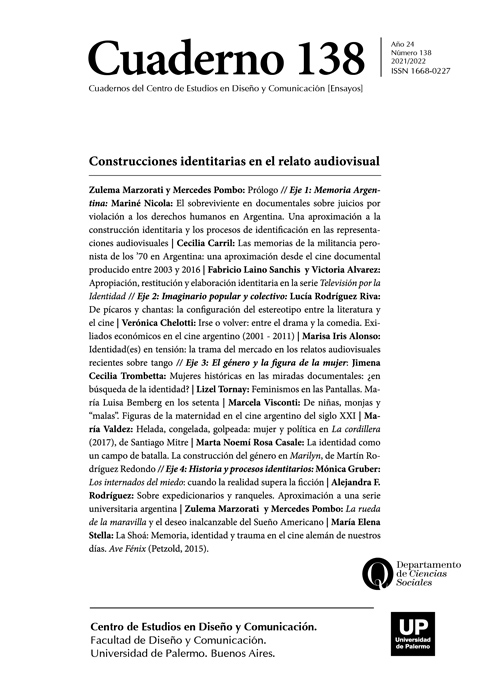Feminismos en las Pantallas. María Luisa Bemberg en los setenta
Abstract
The 1970s evidenced a production of ideas and mobilizations around various themes of social, political, and cultural life. Feminists and women’s movements strongly challenged the hegemonic gender constructions designed around their domesticity. The discussions traversed the world of film production. Laura Mulvey wrote her emblematic text “Visual Pleasure and Narrative Cinema” in 1975, questioning the place in which Hollywood industrial cinema placed women. Simultaneously, numerous European, North American and South American women, cinephiles and / or academics, discussed, exchanged, wrote and produced films outside the commercial circuits. The interest was centered on the search for a cinematographic narrative that would give women an autonomous identity, apart from male visual pleasure. Argentina was not absent from these discussions. María Luisa Bemberg, feminist, founder in 1970 of the Argentine Feminist Union (UFA), began her film production in 1972 with the short film El mundo de la mujer. This work aims to analyze the first cinematographic productions of María Luisa Bemberg (1972 and 1978) within the framework of the organization of local autonomous feminist groups and in dialogue with the ideas circulating beyond the borders, with North American and European colleagues.
References
Barthes, Roland (1999 ) Mitologías. México D.F., Siglo XXI Editores. (versión en español traducción de Héctor Schmucler). 1ra. ed. 1957
De Lauretis, Teresa (1994) Alicia ya no. Feminismo, Semiótica, Cine. Valencia, Ediciones Cátedra. 1ra. ed. 1984.
Forcinito, Ana (2014) “Oyeme con los ojos. Miradas y voces en el cine de María Luisa Bemberg” en Tránsitos de la mirada. Mujeres que hacen cine. Buenos Aires, Libraria Ediciones.
Giunta, Andrea (2019) Feminismo y Arte latinoamericano. Historias de artistas que emanciparon el cuerpo. Buenos Aires, Siglo XXI Editores.
Johnston, Claire (2000) “Women Cinema and counter-cinema” en Ann Kaplan (ed.), Feminism & Film, Oxford, Oxford University Press. 1ra. ed. 1973
Mulvey, Laura (1988) “Visual Pleasure and Narrative Cinema” en Patricia Erens (ed.), Issues in Feminist Film Criticism, Bloomington e Indianapolis, Indiana University Press. (Versión en español: Placer visual y cine narrative, trad. de Santos Zunzunegui, Valencia, Episteme, 1988), 1ra. ed, 1975.
Rosa, María Laura (2014) Legados de Libertad. El arte feminista en la efervescencia democrática. Buenos Aires, Editorial Biblos.
Frevert, Ute (2011) Emotions in History. Lost and Found. The Natalie Zennon Davis Annual Lecture Series. Budapest-New York, Central European University Press.
Tornay, Lizel (2020) “Nuevas fronteras, Viejas y nuevas sensibilidades. Mujeres y tensiones de género en Argentina, siglo XX” en Yoel, Gerardo (comp.) Silencios y violencias de género. Los Polvorines, Universidad Nacional de General Sarmiento.
Vasallo, Alejandra (2005) “Las Mujeres dicen basta: Feminismos y movilización política de los 70” en Andújar et al Historia, Género y Política en los ’70, Buenos Aires, Feminaria.
Los autores/as que publiquen en esta revista ceden los derechos de autor y de publicación a "Cuadernos del Centro de Estudios de Diseño y Comunicación", Aceptando el registro de su trabajo bajo una licencia de atribución de Creative Commons, que permite a terceros utilizar lo publicado siempre que de el crédito pertinente a los autores y a esta revista.


